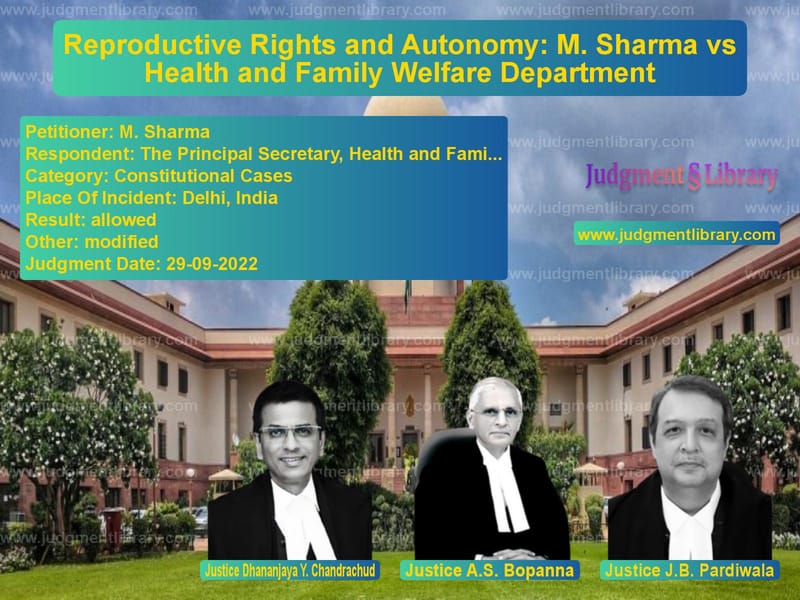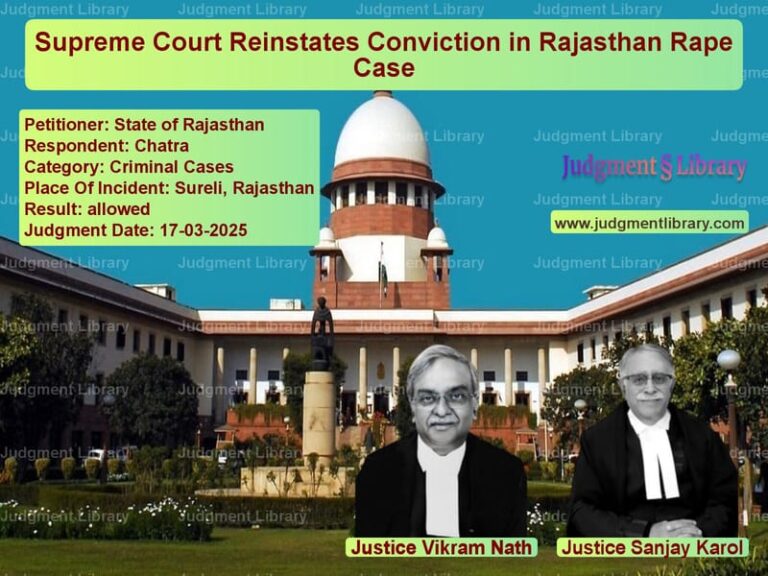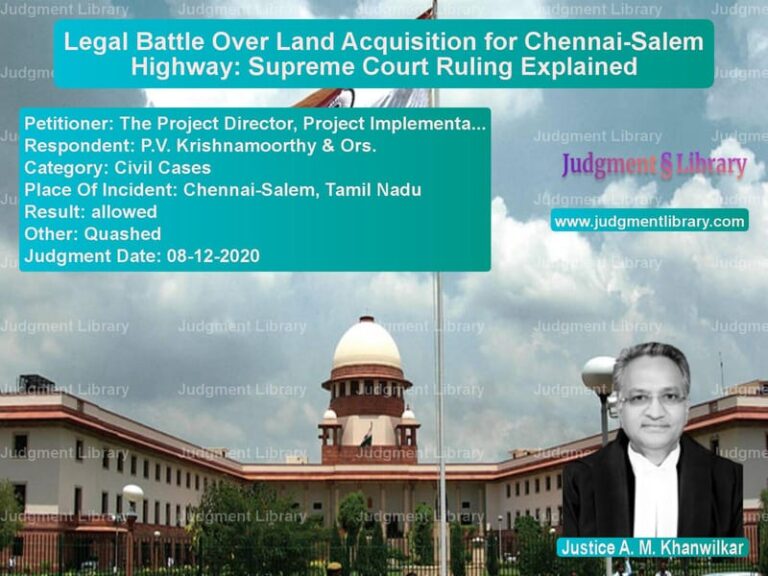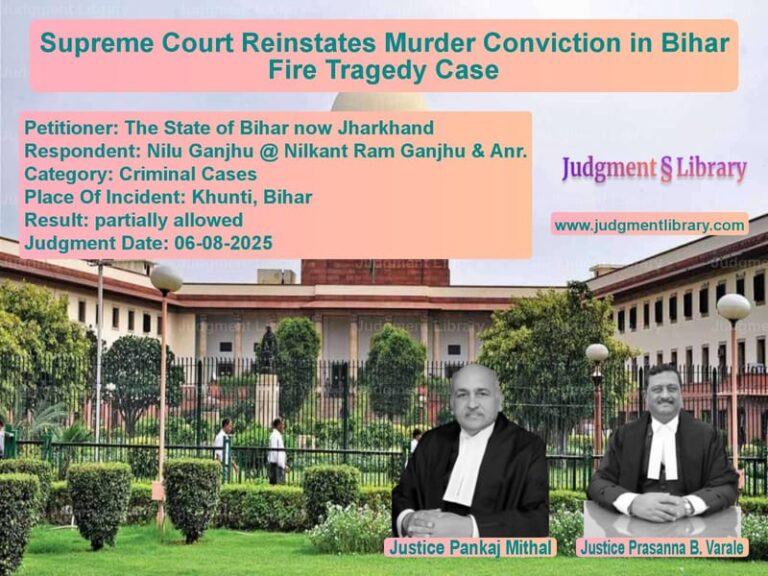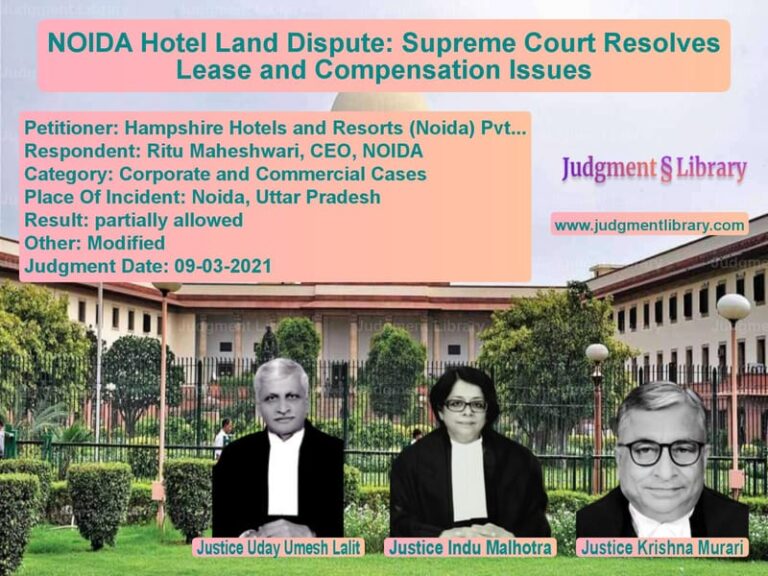Reproductive Rights and Autonomy: M. Sharma vs Health and Family Welfare Department
The case of M. Sharma vs The Principal Secretary, Health and Family Welfare Department, Govt. of NCT of Delhi raises crucial questions regarding reproductive rights and autonomy, particularly focusing on the legal provisions for terminating pregnancies beyond twenty weeks. The case explores whether unmarried women can access abortion services beyond this gestational limit, a matter that is crucial in the context of India’s evolving social and legal landscape. The petitioner, M. Sharma, an unmarried woman, sought permission from the Delhi High Court for the termination of her pregnancy at 22 weeks due to personal circumstances that threatened her mental and physical health. This judgment delves into the legal interpretation of the Medical Termination of Pregnancy (MTP) Act and the associated MTP Rules, particularly Rule 3B, which has significant implications for the rights of women.
Background of the Case
The petitioner, M. Sharma, an unmarried woman aged 25, found herself in a difficult position after becoming pregnant following a consensual relationship. The relationship had ended, and the petitioner was left to cope with the social stigma and potential mental and physical harm of carrying an unwanted pregnancy. The appellant sought permission to terminate her pregnancy under Section 3(2)(b) of the MTP Act and Rule 3B(c) of the MTP Rules, which had recently been amended to extend the legal limit for abortion from 20 to 24 weeks for certain women. However, the High Court dismissed the appeal, stating that unmarried women were not included within the scope of Rule 3B of the MTP Rules. This decision led to an appeal before the Supreme Court, which considered the legal and constitutional implications of excluding unmarried women from this provision.
The Petitioner’s Arguments
The petitioner argued that Rule 3B of the MTP Rules discriminated against unmarried women by denying them the right to access medical termination of pregnancy beyond 20 weeks. Counsel for the petitioner contended that the exclusion violated the right to equality under Article 14 of the Constitution of India and infringed upon the petitioner’s right to reproductive autonomy under Article 21 of the Constitution. The petitioner further emphasized that the continuation of the pregnancy posed a grave injury to her mental health, given the socio-economic and emotional strain she was facing as an unmarried woman, and sought relief from the Court on these grounds.
Read also: https://judgmentlibrary.com/supreme-court-rules-on-speakers-power-in-disqualification-cases/
Additionally, the petitioner argued that there were significant barriers in society preventing unmarried women from accessing safe and legal abortions, including societal stigma, financial constraints, and a lack of access to healthcare. The Court was urged to recognize these social realities and extend the provisions of the MTP Act to unmarried women, thereby ensuring their right to make decisions about their reproductive health.
The Respondent’s Arguments
The respondent, represented by the Health and Family Welfare Department of the Government of Delhi, defended the current interpretation of Rule 3B, asserting that the exclusion of unmarried women was in line with the legislative intent at the time of drafting the MTP Act and its subsequent amendments. The respondent argued that the provisions of the MTP Act and Rules were created to address specific situations, particularly for married women, minors, and those facing severe physical or mental health risks. The exclusion of unmarried women, in the respondent’s view, was a necessary safeguard to protect societal norms and prevent misuse of the legal provisions.
The respondent further contended that the petitioner’s application did not meet the requirements laid out in the MTP Act and the MTP Rules, as there was no proven risk to the petitioner’s life or grave injury to her physical health. The respondent maintained that the High Court’s judgment was correct in limiting the scope of Rule 3B and emphasized the importance of adhering to legal frameworks for the termination of pregnancies beyond the 20-week limit.
The Court’s Analysis
The Supreme Court’s analysis centered around the interpretation of Rule 3B of the MTP Rules, which had been amended in 2021 to allow certain categories of women to access abortion services beyond 20 weeks but excluded unmarried women from this provision. The Court noted the evolving societal views on marriage and family, particularly the recognition of non-traditional family structures, including unmarried women and live-in relationships. The Court emphasized the importance of adapting the law to contemporary societal realities, where unmarried women often face the same challenges and social stigmas as married women in raising children.
Furthermore, the Court examined the purpose of the MTP Act and its primary objective of ensuring that women have access to safe, legal abortions within prescribed limits to protect their health and well-being. The Court found that the exclusion of unmarried women from Rule 3B was discriminatory and violated the principle of equality under Article 14, as it did not provide a clear, justifiable distinction between married and unmarried women in the context of reproductive rights.
The Court also recognized the constitutional right to reproductive autonomy and privacy, as established in previous judgments such as K.S. Puttaswamy v. Union of India, recognizing that reproductive choices are integral to an individual’s dignity and freedom. The Court ruled that the MTP Act, as amended, should be interpreted in a manner that supports the reproductive rights of all women, irrespective of their marital status.
Final Judgment
The Supreme Court ruled in favor of the petitioner, allowing the termination of her pregnancy. The Court clarified that unmarried women should be included under Rule 3B of the MTP Rules, recognizing their right to reproductive autonomy and the need for legal abortion services. The Court ordered the government to revise the MTP Rules to include unmarried women within the scope of the provision for abortions beyond 20 weeks. The judgment was hailed as a significant step towards recognizing the rights of unmarried women and upholding their dignity and autonomy in matters related to reproductive health.
Significance of the Judgment
This judgment marks a critical moment in the legal and social recognition of women’s rights in India. By extending the provisions of the MTP Act to unmarried women, the Supreme Court has reinforced the principle that reproductive rights are fundamental rights, protected by the Constitution. The judgment challenges outdated notions of marital status as a prerequisite for exercising reproductive autonomy and underscores the need for legal reforms that reflect the evolving social landscape. It also highlights the importance of providing women with safe, accessible, and equitable healthcare options, ensuring that their right to make decisions about their bodies is respected without discrimination.
Petitioner Name: M. Sharma.Respondent Name: The Principal Secretary, Health and Family Welfare Department, Govt. of NCT of Delhi.Judgment By: Justice Dhananjaya Y. Chandrachud, Justice A.S. Bopanna, Justice J.B. Pardiwala.Place Of Incident: Delhi, India.Judgment Date: 29-09-2022.
Don’t miss out on the full details! Download the complete judgment in PDF format below and gain valuable insights instantly!
Download Judgment: m.-sharma-vs-the-principal-secret-supreme-court-of-india-judgment-dated-29-09-2022.pdf
Directly Download Judgment: Directly download this Judgment
See all petitions in Fundamental Rights
See all petitions in Constitution Interpretation
See all petitions in Judgment by Dhananjaya Y Chandrachud
See all petitions in Judgment by A. S. Bopanna
See all petitions in Judgment by J.B. Pardiwala
See all petitions in allowed
See all petitions in Modified
See all petitions in supreme court of India judgments September 2022
See all petitions in 2022 judgments
See all posts in Constitutional Cases Category
See all allowed petitions in Constitutional Cases Category
See all Dismissed petitions in Constitutional Cases Category
See all partially allowed petitions in Constitutional Cases Category

